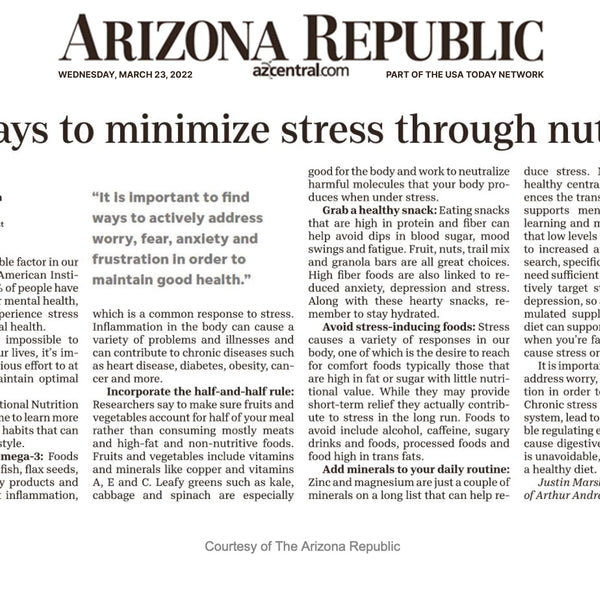
Five Ways to Minimize Stress Through Nutrition

Stress is an unavoidable factor in our lives. According to the American Institute of Stress, about 73 percent of people have stress that impacts their mental health, and 77 percent of people experience stress that affects their physical health. While it may seem impossible to eliminate all stress in our lives, it’s important to make a conscious effort to at least minimize it to maintain optimal health. With March being National Nutrition Month, now is a great time to learn more about developing eating habits that can lead to a stress-free lifestyle.
Below are five ways to help reduce stress through nutrition:
Eat Foods High in Omega-3 Foods high in omega 3 such as fish, flax seeds, chia seeds, walnuts, soy products and avocados can help fight inflammation which is a common response to stress. Inflammation in the body can cause a variety of problems and illnesses and can contribute to chronic disease such as heart disease, diabetes, obesity, cancer and more.
Incorporate the Half and Half Rule Researchers say to make sure fruits and vegetables account for half of your meal rather than consuming mostly meats and high-fat and non-nutritive foods. Fruits and vegetables include vitamins and minerals like copper and vitamins A, E and C. Leafy greens such as kale, cabbage and spinach are especially good for the body and work to neutralize harmful molecules that your body produces when under stress.
Grab a Healthy Snack Eating snacks that are high in protein and/or fiber, can help avoid dips in blood sugar, mood swings and fatigue. Fruit, nuts, trail mix and granola bars are all great choices. High fiber foods are also linked to reduced anxiety, depression and stress. Along with these hearty snacks, remember to stay hydrated.
Avoid Stress-Inducing Foods Stress causes a variety of responses in our body, one of which is the desire to reach for comfort foods typically those that are high in fat or sugar with little nutritional value. While they may provide short term relief they actually contribute to stress in the long run. Foods to avoid include alcohol, caffeine, sugary drinks and foods, processed foods and food high in trans fats.
Add Minerals to Your Daily Routine: Zinc and magnesium are a just a couple of minerals on a long list that can help reduce stress. Magnesium supports a healthy central nervous system, influences the transfer of brain signals, and supports mental processes such as learning and memory. Research shows that low levels of magnesium are linked to increased anxiety. According to research, specific regions of the brain also need sufficient amounts of zinc to effectively target stress, anxiety, and even depression, so adding scientifically-formulated supplements to your regular diet can support an optimal mood, even when you’re faced with situations that cause stress or anxiety.
It is important to find ways to actively address worry, fear, anxiety, and frustration in order to maintain good health. Chronic stress can weaken the immune system, lead to mood changes and trouble regulating emotions, and it can even cause digestive problems. While stress is unavoidable, we can minimize it with a healthy diet.
Bio: Justin Marsh is the Founder and CEO of Arthur Andrew Medical, a leading manufacturer of enzyme and probiotic-based dietary supplements headquartered in Scottsdale.